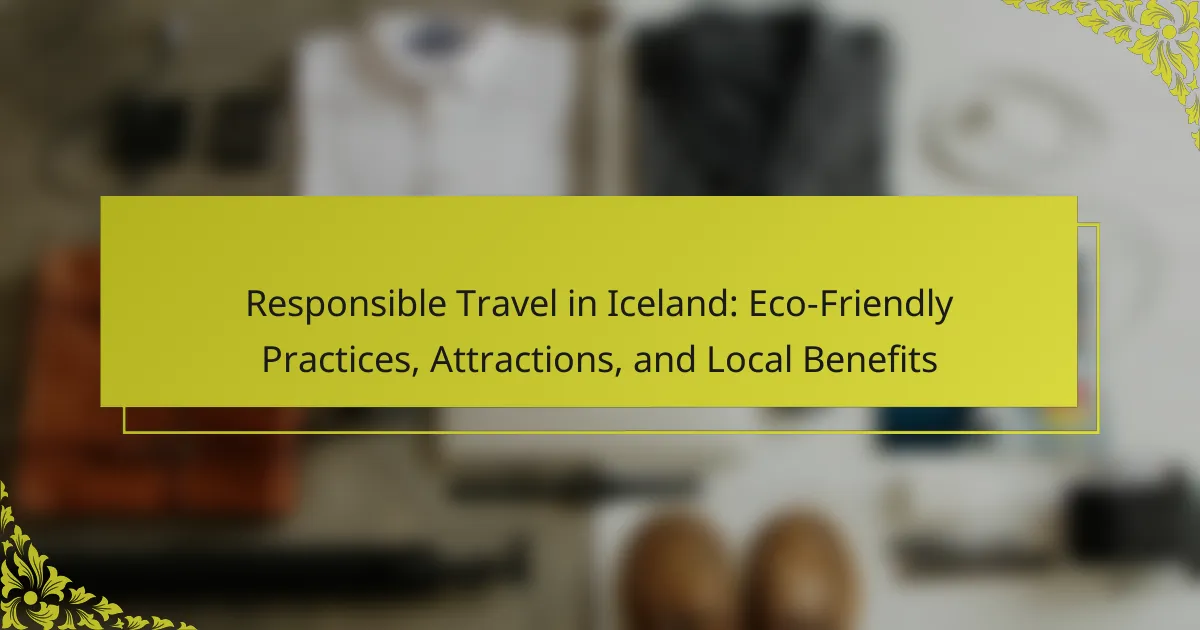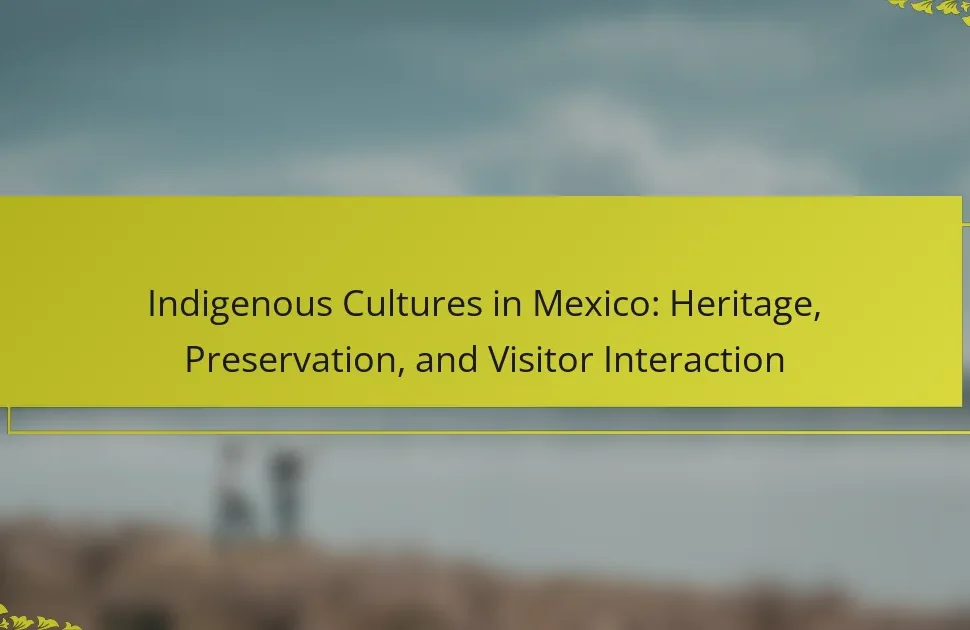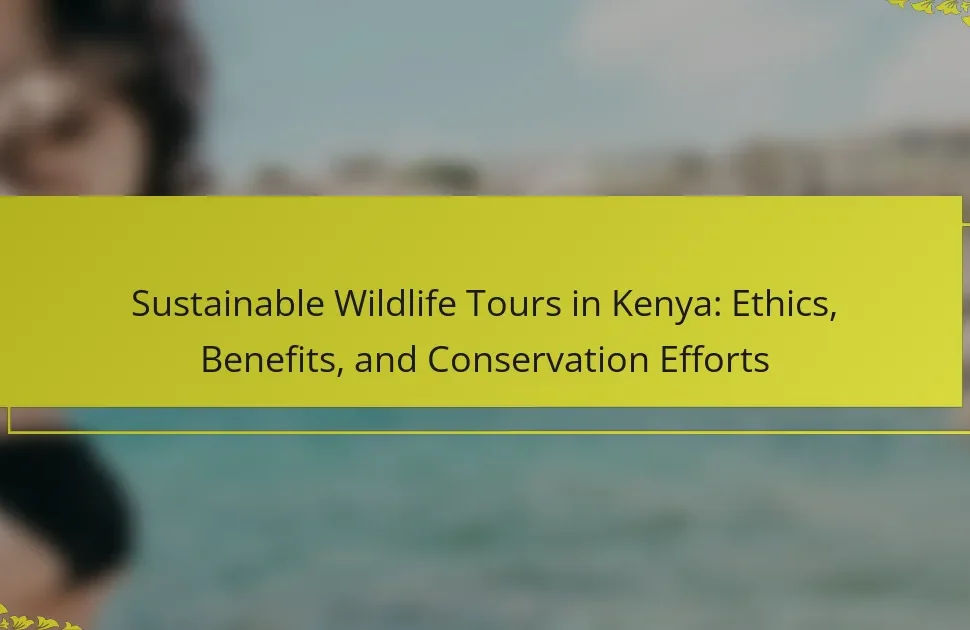Responsible travel in Iceland enhances sustainability while benefiting local communities. This article explores eco-friendly practices, highlights key sustainable attractions, and discusses the positive impact on local economies. Tourists can engage in conservation efforts and support local businesses, ensuring Iceland’s unique environment is preserved for future generations.
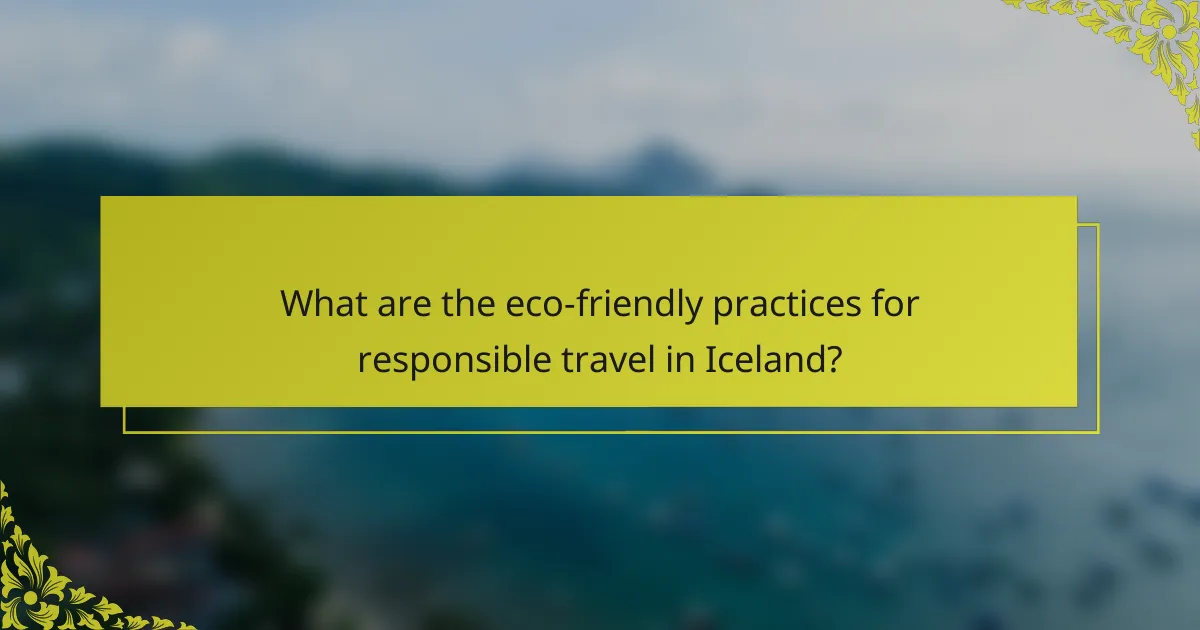
What are the eco-friendly practices for responsible travel in Iceland?
Eco-friendly practices for responsible travel in Iceland include minimizing waste, using public transport, and supporting local businesses. Travelers should prioritize eco-friendly accommodations and participate in conservation activities. These practices enhance sustainability and benefit local communities.
How do sustainable accommodations contribute to local ecology?
Sustainable accommodations enhance local ecology by minimizing resource consumption and protecting natural habitats. They often utilize renewable energy sources, promote waste reduction, and support local biodiversity. For instance, eco-friendly lodges may implement water conservation measures, such as rainwater harvesting, reducing strain on local water supplies. Additionally, these accommodations frequently engage in community initiatives, fostering environmental awareness and encouraging responsible tourism practices. This holistic approach benefits both the environment and local communities, creating a sustainable travel ecosystem in Iceland.
Which transportation options minimize carbon footprints?
Public transportation, biking, and walking are the best transportation options to minimize carbon footprints in Iceland.
Using buses and trains reduces individual emissions significantly compared to private vehicles. Biking and walking not only lower carbon output but also enhance the travel experience by connecting visitors with nature. Eco-friendly car rentals are available, offering electric and hybrid vehicles for those needing flexibility. Additionally, carpooling with locals can further decrease emissions while promoting community engagement.
What role do local food sources play in reducing environmental impact?
Local food sources significantly reduce environmental impact by minimizing transportation emissions and supporting sustainable practices. In Iceland, sourcing food locally lowers carbon footprints and promotes biodiversity. Additionally, local agriculture utilizes unique practices tailored to the environment, enhancing soil health and reducing water usage. This approach fosters a connection between travelers and local communities, encouraging responsible consumption and supporting the economy.
How can tourists engage in conservation efforts during their visit?
Tourists can actively participate in conservation efforts in Iceland by engaging in eco-friendly practices. They can choose sustainable tours that prioritize wildlife protection, minimize waste, and support local communities.
Volunteering for local conservation projects is another effective way to contribute. Tourists can join initiatives focused on preserving natural habitats or participating in beach clean-ups.
Educating themselves about Iceland’s unique ecosystems enhances their understanding and appreciation of the environment. Tourists can also support local businesses that prioritize sustainability, ensuring their travel choices benefit the community.
Lastly, practicing responsible behavior, such as staying on marked trails and respecting wildlife, helps protect Iceland’s natural beauty for future visitors.
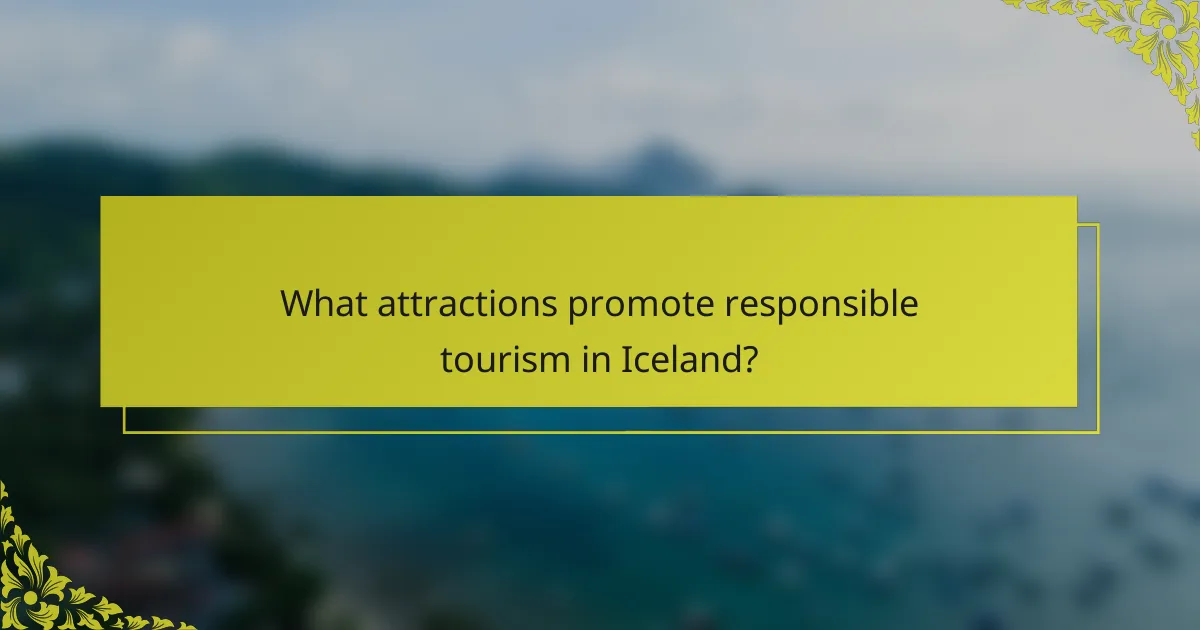
What attractions promote responsible tourism in Iceland?
Iceland promotes responsible tourism through attractions that prioritize sustainability and community engagement. Key sites include the Golden Circle, which emphasizes geothermal energy and conservation, and the Snaefellsnes Peninsula, known for its eco-friendly tours. Additionally, the Blue Lagoon supports local agriculture by using mineral-rich waters sustainably. Local initiatives like community-led wildlife tours foster awareness and appreciation of Iceland’s unique ecosystems. These attractions not only provide unique experiences but also benefit the environment and local communities.
Which natural wonders are best experienced with minimal impact?
Iceland’s natural wonders can be best experienced with minimal impact by visiting sites like Þingvellir National Park, Snaefellsnes Peninsula, and the Westfjords. These locations promote eco-friendly practices and offer breathtaking landscapes while encouraging responsible tourism.
Þingvellir National Park features unique geological formations and is a UNESCO World Heritage site. Snaefellsnes Peninsula boasts diverse ecosystems and is accessible via sustainable travel options. The Westfjords, less frequented by tourists, provide pristine nature and opportunities for wildlife observation, supporting local economies through eco-tourism.
How do guided tours enhance eco-friendly exploration?
Guided tours enhance eco-friendly exploration by promoting sustainable practices and minimizing environmental impact. They facilitate responsible travel by educating participants on local ecosystems and conservation efforts. Tour operators often collaborate with local communities, ensuring that economic benefits directly support sustainable initiatives. Additionally, guided tours reduce the carbon footprint of exploration by consolidating transportation and limiting visitor numbers in sensitive areas.
What cultural sites support sustainable tourism initiatives?
Iceland’s cultural sites actively support sustainable tourism through eco-friendly practices. These initiatives include community engagement, conservation efforts, and promoting local culture. Notable examples are the Þingvellir National Park, which emphasizes preservation and education, and the Harpa Concert Hall, which uses sustainable materials and practices. Additionally, many sites offer guided tours that educate visitors on environmental stewardship. These efforts enhance local benefits by fostering economic growth while protecting Iceland’s unique heritage.
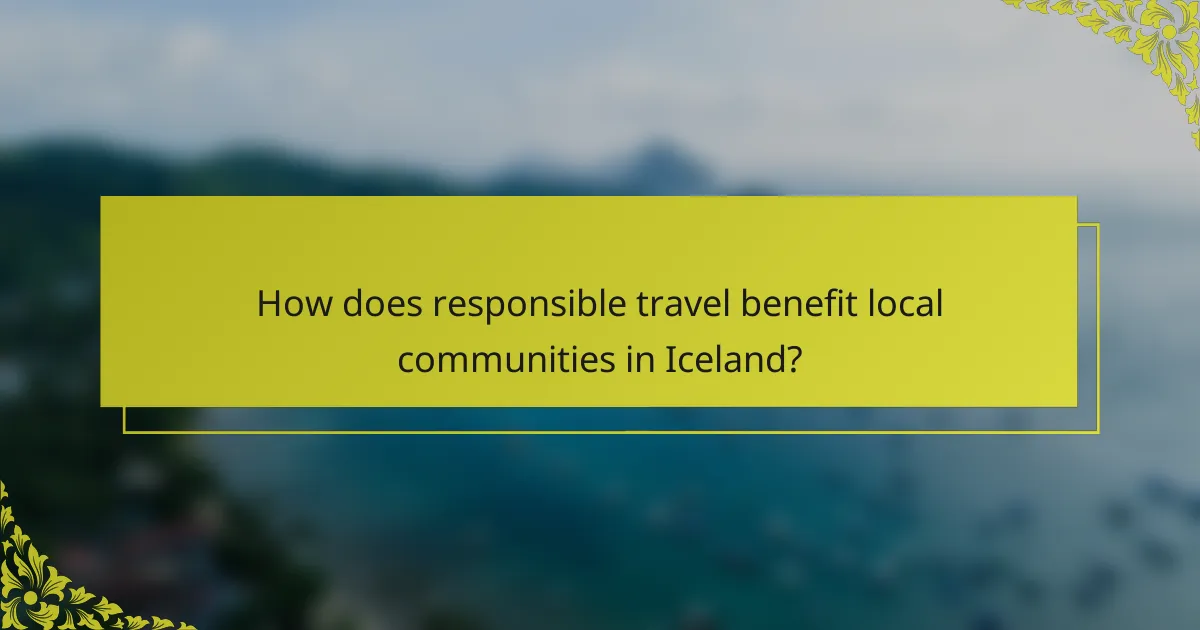
How does responsible travel benefit local communities in Iceland?
Responsible travel in Iceland significantly benefits local communities by promoting sustainable practices and preserving cultural heritage. It fosters economic growth by supporting local businesses, such as artisans and tour operators. Eco-friendly tourism encourages environmental conservation, ensuring that natural attractions remain pristine for future generations. Additionally, responsible travel creates awareness about local issues, empowering communities to engage in sustainable development initiatives.
What economic advantages does sustainable tourism provide?
Sustainable tourism in Iceland provides economic advantages such as job creation, increased local revenue, and preservation of natural resources. Eco-friendly practices attract environmentally conscious travelers, boosting the economy while ensuring the protection of Iceland’s unique landscapes. Local businesses benefit from increased demand for sustainable products and services. Additionally, responsible tourism promotes community engagement and investment in conservation efforts, enhancing the overall quality of life for residents.
How does responsible travel foster cultural preservation?
Responsible travel fosters cultural preservation by promoting respect for local traditions and sustainable practices. Tourists who engage in eco-friendly activities support local artisans and heritage sites, ensuring these cultural elements thrive. This approach minimizes environmental impact, allowing communities to maintain their cultural identity. Additionally, responsible travel encourages education about local customs, fostering appreciation and understanding. As a result, communities benefit economically while preserving their unique heritage for future generations.
What community-led projects are supported by eco-tourism?
Community-led projects supported by eco-tourism in Iceland include local conservation initiatives, sustainable farming, and cultural heritage programs. These projects empower communities, enhance biodiversity, and promote traditional practices. For instance, eco-tourism funding aids in protecting vulnerable landscapes and wildlife, ensuring a balance between tourism and environmental preservation. Additionally, community engagement fosters pride and economic benefits, creating a sustainable model for future generations.
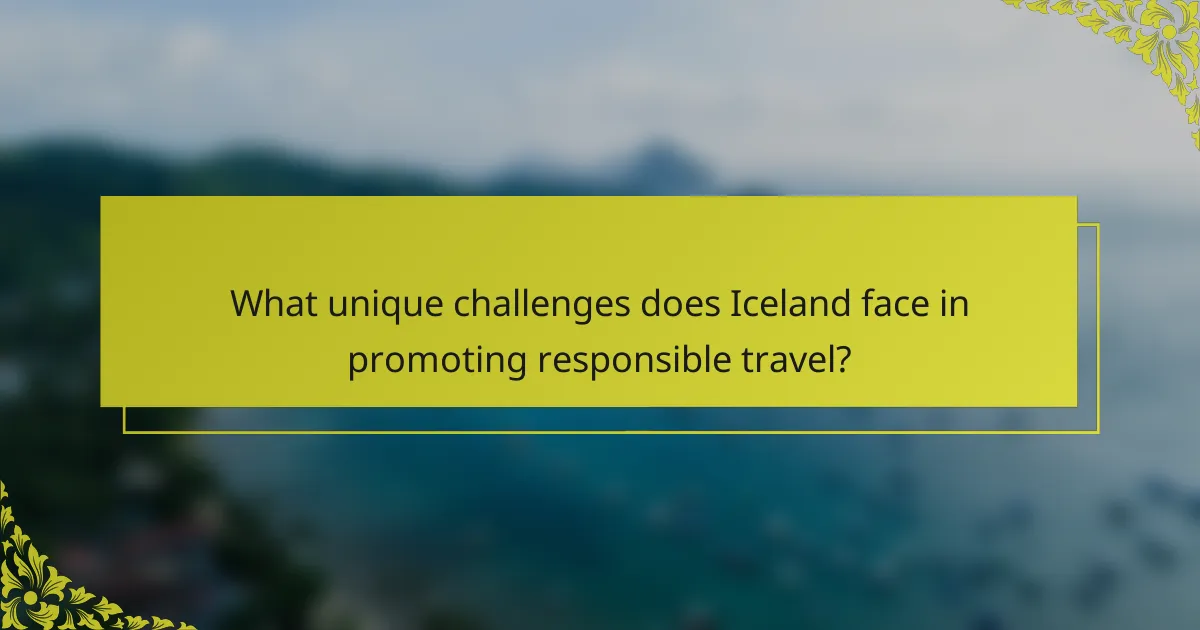
What unique challenges does Iceland face in promoting responsible travel?
Iceland faces unique challenges in promoting responsible travel, primarily due to its delicate ecosystems and increasing tourist numbers. The country’s stunning natural landscapes attract millions, leading to potential environmental degradation. Limited infrastructure and seasonal variations complicate sustainable tourism efforts. Additionally, balancing local community interests and tourist demands presents ongoing difficulties.
How do seasonal tourism patterns affect sustainability efforts?
Seasonal tourism patterns significantly impact sustainability efforts in Iceland. Increased visitor numbers during peak seasons strain local resources, leading to environmental degradation. This pressure can hinder eco-friendly practices and diminish local benefits. For instance, waste management systems may struggle to cope with high tourist volumes, resulting in pollution. Conversely, off-peak tourism promotes sustainable practices by allowing ecosystems to recover and local communities to benefit from consistent visitor flow. Balancing tourism seasons is crucial for maintaining Iceland’s natural beauty and supporting responsible travel initiatives.
What impacts do climate change and natural disasters have on tourism?
Climate change and natural disasters significantly affect tourism by altering travel patterns and impacting local ecosystems. For Iceland, responsible travel practices can mitigate these effects while promoting sustainability. Increased weather variability can deter visitors, while natural disasters may damage attractions. Eco-friendly practices, such as carbon offsetting and supporting local businesses, can enhance resilience. Local benefits include preserving natural landscapes and fostering community engagement, which strengthens tourism’s economic foundation.
How is infrastructure adapting to support eco-friendly travel?
Infrastructure in Iceland is increasingly adapting to support eco-friendly travel through sustainable practices. Renewable energy sources, such as geothermal and hydroelectric power, are integrated into transportation systems. Electric vehicle charging stations are being installed across popular tourist routes to encourage low-emission travel. Additionally, public transportation is being enhanced with eco-friendly buses and bike-sharing programs to reduce carbon footprints. These initiatives not only benefit the environment but also promote local economic growth by attracting eco-conscious travelers.
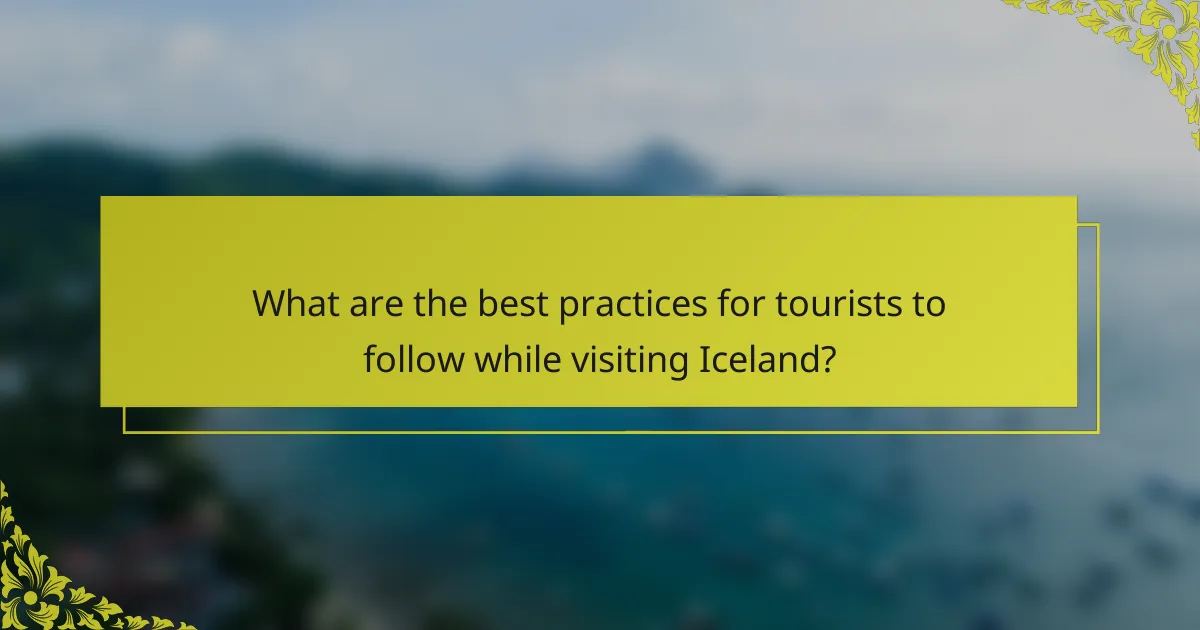
What are the best practices for tourists to follow while visiting Iceland?
Tourists should prioritize eco-friendly practices to protect Iceland’s unique environment. Respect local wildlife and adhere to marked trails to prevent habitat damage. Use reusable water bottles and bags to minimize waste. Support local businesses and eat locally sourced food to benefit the community. Avoid single-use plastics and participate in clean-up initiatives to preserve natural landscapes.
How can visitors minimize waste during their stay?
Visitors can minimize waste during their stay by adopting eco-friendly practices. Use reusable items like water bottles and bags to reduce single-use plastics. Participate in local recycling programs to dispose of waste properly. Choose accommodations that prioritize sustainability and waste reduction. Support local businesses that practice responsible sourcing and waste management. Engage in activities that promote environmental awareness, such as guided tours focused on conservation.
What etiquette should travelers observe to respect local customs?
Travelers should observe local customs by being respectful, informed, and adaptable. Understanding Icelandic culture enhances the travel experience and promotes responsible tourism.
1. Learn basic Icelandic phrases to communicate with locals.
2. Respect nature by following marked trails and avoiding off-road driving.
3. Observe local traditions, such as the importance of geothermal baths.
4. Support local businesses by purchasing handmade crafts and dining at local eateries.
5. Dress appropriately for the weather and activities, showing respect for Iceland’s environment.
6. Be mindful of wildlife, maintaining a safe distance from animals and their habitats.
Which resources are available for planning a sustainable trip?
Numerous resources are available for planning a sustainable trip in Iceland. Websites like Visit Iceland provide eco-friendly travel tips and itineraries. Local organizations promote sustainable practices, such as minimizing waste and supporting local businesses. Additionally, guidebooks focused on responsible travel offer insights into eco-conscious accommodations and attractions. Apps for tracking carbon footprints can help travelers make informed choices. Engaging with local communities enhances the experience and fosters environmental stewardship.
